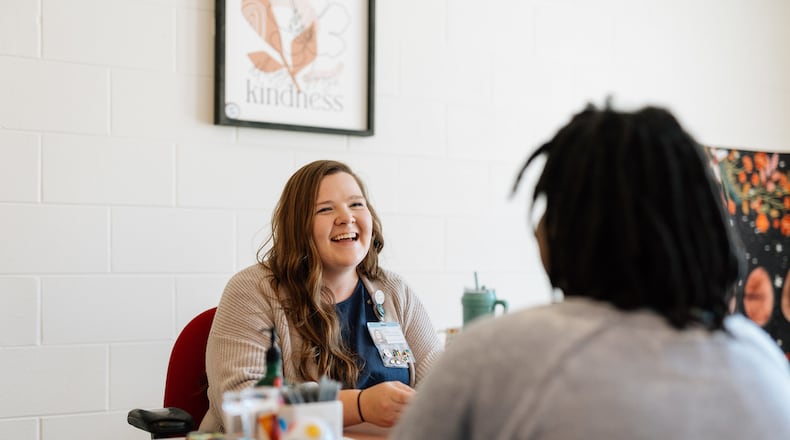There are eight existing Dayton Children’s programs to promote positive mental, emotional, behavioral and physical health development in children and adolescents that will be combined into the Center for Emotional Wellbeing, which will be located at Dayton Children’s Connor Child Health Pavilion.
Emotional wellbeing builds resiliency to life’s challenges and gives children the ability to cope with the ups and downs of life, Dayton Children’s said.
Barriers such as socioeconomic status, unstable family relationships, social media and technology and lingering impacts from the COVID-19 pandemic can impact a child’s ability to experience emotional wellbeing, the children’s health system said.
To create the Center for Emotional Wellbeing, Dayton Children’s aligned programs that already existed throughout the continuum of mental health care “under one roof” to share the broad scope of work being done throughout the community, Dayton Children’s said.
“The center’s 100-plus employees serve children and families wherever there’s a need — at home, in school and at local pediatrician offices,” said Fralick. “We provide support, education and skill-building early on to prevent crisis situations in the future that are more challenging and expensive to treat.”
Programs that fall under the Center for Emotional Wellbeing include programs based in clinics, community, home and school.
The clinic-based programs includes HealthySteps, which provides parenting and child development support for families of children up to to three years old.
Community-based programs include mental health first aid and suicide prevention training, which are available to community members, as well as Dayton Children’s staff.
Another community-based program is Dayton Children’s On Our Sleeves program, which provides tools to educate adults on childhood mental wellness to reduce stigma around childhood mental health.
Home-based programs include Dayton Children’s community health workers, who work with children and families where they live to help them overcome barriers to improving their health. This can include equipping them with information and tools to address their mental and physical health outcomes.
School-based programs include therapists embedded in local schools and after-school programs, along with student resiliency programs. Student resiliency coordinators provide resiliency development for students and families impacted by trauma by working full-time at area schools helping students build on their strengths, Dayton Children’s said.
Additional resource programs include Dayton Children’s Mental Health Resource Connection, which works with community pediatrician offices to connect patients and families to mental health services.
Dayton Children’s also offers a Youth and Family Resource Connection, which works with area school staff to connect students and families with local resources that promote social and mental wellness.
“Helping children who struggle emotionally is critical,” says Sue. “If we wait too long, symptoms of anxiety, depression and other mental health concerns may develop. They can become chronic, lasting weeks, months or even years.”
In addition to the new center, Dayton Children’s continues its work on a new behavioral health building, scheduled to open in 2025. This $110 million facility will double the number of beds for behavioral health patients, as well as bring behavioral health inpatient, outpatient and crisis services under one roof.
Dayton Children’s is an independent, freestanding children’s hospital located in Dayton, treating more than 400,000 children each year across 20 counties in Ohio and eastern Indiana. The hospital has two campuses, Dayton and Springboro, and more than 15 care sites including facilities in Troy, Beavercreek and Kettering.
About the Author

